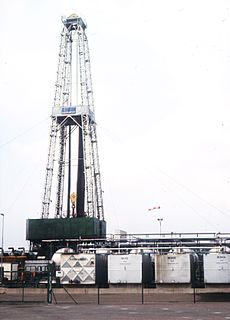A license or licence is an official permission or permit to do, use, or own something.

Hydrocarbon exploration is the search by petroleum geologists and geophysicists for deposits of hydrocarbons, particularly petroleum and natural gas, in the Earth using petroleum geology.
A broadcast license is a type of spectrum license granting the licensee permission to use a portion of the radio frequency spectrum in a given geographical area for broadcasting purposes. The licenses generally include restrictions, which vary from band to band.
The Canadian Nuclear Safety Commission is the federal regulator of nuclear power and materials in Canada. In addition to nuclear power plants and nuclear research facilities, the CNSC regulates numerous other uses of nuclear material such as radionuclides used in the treatment of cancer, the operation of uranium mines and refineries, and the use of radioactive sources for oil exploration, and in instruments such as precipitation measurement devices. The CNSC is an agency of the Government of Canada which reports to the Parliament of Canada through the Minister of Natural Resources.
This is a comparison of published free software licenses and open-source licenses. The comparison only covers software licenses with a linked article for details, approved by at least one expert group at the FSF, the OSI, the Debian project or the Fedora project. For a list of licenses not specifically intended for software, see List of free content licenses.
Since its inception in 1920, The Association of Professional Engineers and Geoscientists of Alberta (APEGA) has been serving the public interest by regulating the practices of professional engineering and geoscience in Alberta. Professional Engineers and Professional Geoscientists contribute significantly to Alberta’s economic success and the enhanced quality of life enjoyed by all Albertans.
The Ruby License is a Free and Open Source license applied to the Ruby programming language and also available to be used in other projects. It is approved by the Free Software Foundation although it has not been approved Open Source by the Open Source Initiative.

The Security Industry Authority (SIA) is the statutory organisation responsible for regulating the private security industry in the UK. Established as a non-departmental public body in 2003, the SIA reports to the Home Secretary under the terms of the Private Security Industry Act 2001.
A building control body is an organisation authorised to control building work that is subject to the Building Regulations in England and Wales. Building control roles are exercised by officers in local authorities and by private sector Approved Inspectors.
United Kingdom agency worker law refers to the law which regulates people's work through employment agencies in the United Kingdom. Though statistics are disputed, there are currently between half a million and one and a half million agency workers in the UK, and probably over 17,000 agencies. As a result of judge made law and absence of statutory protection, agency workers have more flexible pay and working conditions than permanent staff covered under the Employment Rights Act 1996.
The Ministry of Mines, a branch of the Government of India, is the apex body for formulation and administration of the rules and regulations and laws relating to mines in India. The head of the ministry is Pralhad Joshi since June 2019.
In India, a customs house agent (CHA) is licensed to act as an agent for transaction of any business relating to the entry or departure of conveyances or the import or export of goods at a customs station. CHAs maintain detailed, itemized and up-to-date accounts. A CHA license may be temporary or permanent.
Petroleum licensing or exploration license is the act of giving licenses to a company or a joint venture allowing them to search for commercially feasible deposits for the extraction of petroleum.

The province of New Brunswick has created and implemented various Acts, such as the Clean Environment Act, Clean Air Act, and the Clean Water Act, throughout history to ensure that the environment is considered and protected throughout various project. These acts describe the process that will be undertaken to assess the impact of projects, and the steps to be taken when certain situations arise.
The petroleum fiscal regime of a country is a set of laws, regulations and agreements which governs the economical benefits derived from petroleum exploration and production. The regime regulates transactions between the political entity and the legal entities involved. A commercial or legal entity in this context is commonly an oil company, and two or more companies may establish partnerships to share economic risks and investment capital.
CION-FM was a French language radio station that operated on 103.7 MHz/FM in Rivière-du-Loup, Quebec, Canada.
The Ghana Local Content and Local Participation Bill 2013 is a bill passed in November 2013 by the Ghanaian government that stipulates that Ghanaians should be prioritised in terms of employment in the petroleum industry, and should benefit from the country’s resources. The law is expected to ensure that Ghana’s natural resources benefit Ghanaians, while also allowing foreign oil companies to reap fair returns on their investment.
The Hydrocarbons Licensing Directive Regulations 1995 is a UK Statutory Instrument that implements the Hydrocarbons Directive 94/22/EC. It is relevant for UK enterprise law by determining the procedural steps that ought to be taken when a company is licensed to seek or extract oil and gas.
The Real Estate Authority (REA), formerly the Real Estate Agents Authority (REAA), is the New Zealand Crown entity responsible for the regulation of the New Zealand real estate industry as well as the agents within it.
The Ministry of Oil Industry was a government ministry in the Soviet Union.




